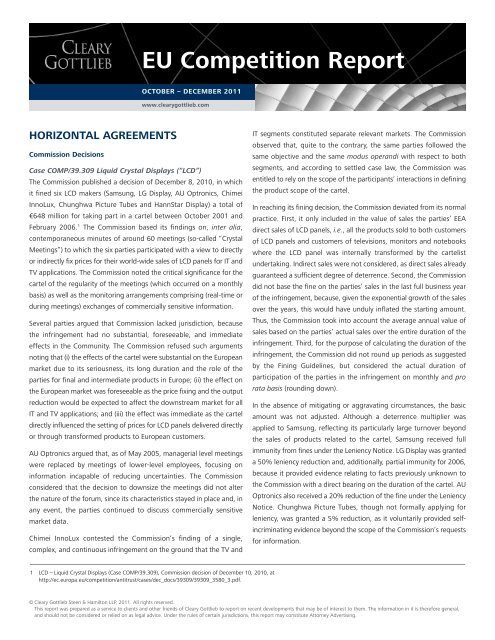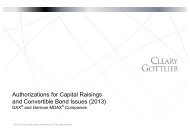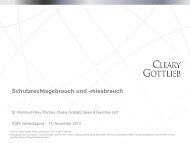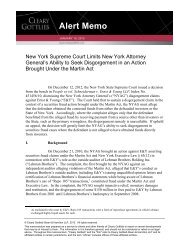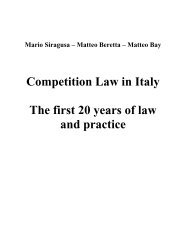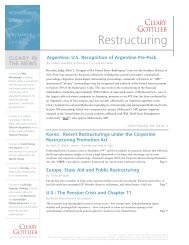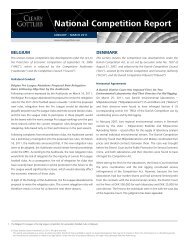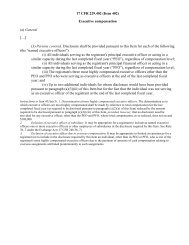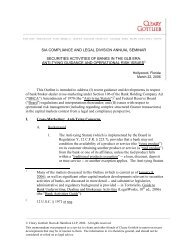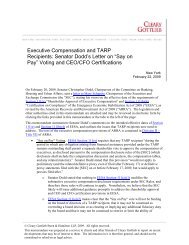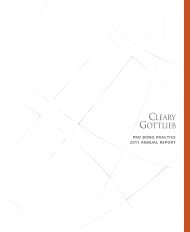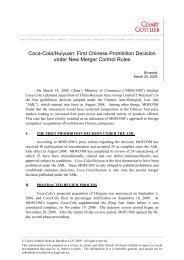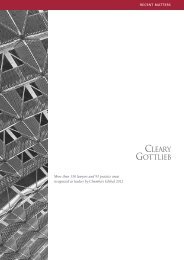EU Competition Report - Cleary Gottlieb Steen & Hamilton LLP
EU Competition Report - Cleary Gottlieb Steen & Hamilton LLP
EU Competition Report - Cleary Gottlieb Steen & Hamilton LLP
You also want an ePaper? Increase the reach of your titles
YUMPU automatically turns print PDFs into web optimized ePapers that Google loves.
HORIZONTAL AGREEMENTS<br />
Commission Decisions<br />
Case COMP/39.309 Liquid Crystal Displays (“LCD”)<br />
The Commission published a decision of December 8, 2010, in which<br />
it fined six LCD makers (Samsung, LG Display, AU Optronics, Chimei<br />
InnoLux, Chunghwa Picture Tubes and HannStar Display) a total of<br />
€648 million for taking part in a cartel between October 2001 and<br />
February 2006. 1 The Commission based its findings on, inter alia,<br />
contemporaneous minutes of around 60 meetings (so-called “Crystal<br />
Meetings”) to which the six parties participated with a view to directly<br />
or indirectly fix prices for their world-wide sales of LCD panels for IT and<br />
TV applications. The Commission noted the critical significance for the<br />
cartel of the regularity of the meetings (which occurred on a monthly<br />
basis) as well as the monitoring arrangements comprising (real-time or<br />
during meetings) exchanges of commercially sensitive information.<br />
Several parties argued that Commission lacked jurisdiction, because<br />
the infringement had no substantial, foreseeable, and immediate<br />
effects in the Community. The Commission refused such arguments<br />
noting that (i) the effects of the cartel were substantial on the European<br />
market due to its seriousness, its long duration and the role of the<br />
parties for final and intermediate products in Europe; (ii) the effect on<br />
the European market was foreseeable as the price fixing and the output<br />
reduction would be expected to affect the downstream market for all<br />
IT and TV applications; and (iii) the effect was immediate as the cartel<br />
directly influenced the setting of prices for LCD panels delivered directly<br />
or through transformed products to European customers.<br />
AU Optronics argued that, as of May 2005, managerial level meetings<br />
were replaced by meetings of lower-level employees, focusing on<br />
information incapable of reducing uncertainties. The Commission<br />
considered that the decision to downsize the meetings did not alter<br />
the nature of the forum, since its characteristics stayed in place and, in<br />
any event, the parties continued to discuss commercially sensitive<br />
market data.<br />
Chimei InnoLux contested the Commission’s finding of a single,<br />
complex, and continuous infringement on the ground that the TV and<br />
<strong>EU</strong> <strong>Competition</strong> <strong>Report</strong><br />
OCTOBER – DECEMBER 2011<br />
www.clearygottlieb.com<br />
1 LCD – Liquid Crystal Displays (Case COMP/39.309), Commission decision of December 10, 2010, at<br />
http://ec.europa.eu/competition/antitrust/cases/dec_docs/39309/39309_3580_3.pdf.<br />
IT segments constituted separate relevant markets. The Commission<br />
observed that, quite to the contrary, the same parties followed the<br />
same objective and the same modus operandi with respect to both<br />
segments, and according to settled case law, the Commission was<br />
entitled to rely on the scope of the participants’ interactions in defining<br />
the product scope of the cartel.<br />
In reaching its fining decision, the Commission deviated from its normal<br />
practice. First, it only included in the value of sales the parties’ EEA<br />
direct sales of LCD panels, i.e., all the products sold to both customers<br />
of LCD panels and customers of televisions, monitors and notebooks<br />
where the LCD panel was internally transformed by the cartelist<br />
undertaking. Indirect sales were not considered, as direct sales already<br />
guaranteed a sufficient degree of deterrence. Second, the Commission<br />
did not base the fine on the parties’ sales in the last full business year<br />
of the infringement, because, given the exponential growth of the sales<br />
over the years, this would have unduly inflated the starting amount.<br />
Thus, the Commission took into account the average annual value of<br />
sales based on the parties’ actual sales over the entire duration of the<br />
infringement. Third, for the purpose of calculating the duration of the<br />
infringement, the Commission did not round up periods as suggested<br />
by the Fining Guidelines, but considered the actual duration of<br />
participation of the parties in the infringement on monthly and pro<br />
rata basis (rounding down).<br />
In the absence of mitigating or aggravating circumstances, the basic<br />
amount was not adjusted. Although a deterrence multiplier was<br />
applied to Samsung, reflecting its particularly large turnover beyond<br />
the sales of products related to the cartel, Samsung received full<br />
immunity from fines under the Leniency Notice. LG Display was granted<br />
a 50% leniency reduction and, additionally, partial immunity for 2006,<br />
because it provided evidence relating to facts previously unknown to<br />
the Commission with a direct bearing on the duration of the cartel. AU<br />
Optronics also received a 20% reduction of the fine under the Leniency<br />
Notice. Chunghwa Picture Tubes, though not formally applying for<br />
leniency, was granted a 5% reduction, as it voluntarily provided selfincriminating<br />
evidence beyond the scope of the Commission’s requests<br />
for information.<br />
© <strong>Cleary</strong> <strong>Gottlieb</strong> <strong>Steen</strong> & <strong>Hamilton</strong> <strong>LLP</strong>, 2011. All rights reserved.<br />
This report was prepared as a service to clients and other friends of <strong>Cleary</strong> <strong>Gottlieb</strong> to report on recent developments that may be of interest to them. The information in it is therefore general,<br />
and should not be considered or relied on as legal advice. Under the rules of certain jurisdictions, this report may constitute Attorney Advertising.
<strong>EU</strong> COMPETITION REPORT OCTOBER – DECEMBER 2011 2<br />
VERTICAL RESTRAINTS<br />
ECJ – Judgments<br />
Case C-439/09 Pierre Fabre Dermo-Cosmétique SAS v.<br />
Président De L’Autorité De La Concurrence And Ministre De<br />
L’Économie, De L’Industrie Et De L’Emploi<br />
On October 13, 2011, the European Court of Justice ruled that<br />
barring online sales is incompatible with Article 101 TF<strong>EU</strong>.<br />
Pierre Fabre manufactures and markets cosmetics and personal care<br />
products. On June 27, 2006, the French <strong>Competition</strong> Authority<br />
began an investigation concerning clauses barring online sales of<br />
these products, focusing on, inter alia, a requirement in Pierre Fabre’s<br />
selective distribution contracts that the products had to be sold in a<br />
physical space that complied with specific criteria and that a qualified<br />
pharmacist be present at the retailer’s point of sale during all opening<br />
hours in order to provide personalised advice to customers. This<br />
requirement led to a de facto ban of Internet sales.<br />
The Court was asked whether a general and absolute ban on selling<br />
contract goods to end-users via the Internet in the context of a<br />
selective distribution network constitutes a restriction of competition<br />
by object for the purposes of Article 101 (1) TF<strong>EU</strong>, 2 whether such a<br />
ban could be covered by Regulation 2790/1999, the block exemption<br />
regulation for certain vertical restraints, and, if not, whether it might<br />
be eligible for an individual exemption under Article 101(3).<br />
The Court agreed with the <strong>EU</strong> Commission that the de facto<br />
exclusion of a method of marketing products that does not require<br />
the physical movement of the customer considerably reduces the<br />
ability of an authorised distributor to sell the contractual products<br />
to customer outside its contractual territory or area of activity, and<br />
is therefore liable to restrict competition.<br />
As a general matter, the Court recalled that selective distribution<br />
systems must be considered, in the absence of an objective<br />
justification, as a restriction of competition by object. It added that<br />
its consistent case law nevertheless recognizes that there are<br />
legitimate requirements, such as the maintenance of a specialist<br />
trade capable of providing specific services with respect to highquality<br />
and high-technology products, which may justify a reduction<br />
of price competition in favour of competition relating to factors other<br />
than price. Systems of selective distribution, in so far as they aim to<br />
achieve a legitimate goal capable of improving competition in<br />
www.clearygottlieb.com<br />
relation to factors other than price have thus been recognized as an<br />
element of competition which complies with Article 101(1) TF<strong>EU</strong>.<br />
The Court repeated its consistent case law that a selective<br />
distribution system is not prohibited by Article 101(1) TF<strong>EU</strong> if resellers<br />
are chosen on the basis of objective criteria of a qualitative nature,<br />
laid down uniformly for all potential resellers and not applied in a<br />
discriminatory fashion. In addition, the characteristics of the product<br />
in question must require such a network in order to preserve its<br />
quality and proper use, and the applicable criteria are proportionate<br />
to this aim.<br />
Although the Court noted that it is for the national court to decide<br />
whether the Internet ban in this case could be justified by a<br />
legitimate aim, the Court nevertheless provided some guidance. It<br />
recognized that Pierre Fabre’s resellers were chosen on the basis of<br />
non-discriminatory and objective criteria of a qualitative nature.<br />
However, the next question was whether the restrictions of<br />
competition pursue legitimate aims in a proportionate manner.<br />
Referring to its case law in the field of the fundamental freedoms,<br />
the Court noted that it had rejected arguments to justify a ban on<br />
Internet sales relating to the need to provide individual advice to the<br />
customers and to ensure his protection against the incorrect use of<br />
products, in the context of non-prescription medicines and contact<br />
lenses. The Court also rejected the preservation of the prestigious<br />
image of the products as a legitimate aim justifying a ban on Internet<br />
sales in just one sentence containing no reasoning or justification.<br />
The Court concluded that a ban on Internet sales amounts to a<br />
restriction of competition by object where “. . . following an<br />
individual and specific examination of the content and objective of<br />
that contractual clause and the legal and economic context of which<br />
it forms a part, it is apparent that, having regard to the properties<br />
of the products at issue, that clause is not objectively justified.” 3<br />
Regarding the second question, the Court found that Article 4(c) of<br />
Block Exemption Regulation 2790/1999, which excludes from the<br />
regulation’s scope selective distribution agreements that have the<br />
object of restricting active and passive sales to end users, applied in<br />
this case because the de facto ban on internet sales had the object<br />
of restricting at least passive sales to customers end-users wishing to<br />
purchase online and located outside the physical trading area of the<br />
relevant member of the selective distribution system. The Court<br />
2 Initially, the French Court of Appeal used a different terminology by referring to a “hardcore restriction of competition by object.” The Court, however, reformulated this question<br />
in the way described above.<br />
3 Pierre Fabre Dermo-Cosmétique SAS v. Président De L’Autorité De La Concurrence, Ministre De L’Economie, De L’Industrie Et De L’Emploi (Case C-439/09) judgment of October 13,<br />
2011, para. 47, not yet published.
<strong>EU</strong> COMPETITION REPORT OCTOBER – DECEMBER 2011 3<br />
rejected Pierre Fabre’s argument that the ban should be deemed<br />
equivalent to prohibiting a reseller from operating in an unauthorized<br />
establishment, on the grounds that Internet sales are a marketing<br />
method, and not an unauthorized place of establishment.<br />
Finally, the Court did not exclude the possibility that an Internet ban<br />
could be exempted under Article 101(3) TF<strong>EU</strong>, but declined to<br />
provide further guidance to the national court, because it did not<br />
have enough information, leaving the national court to decide<br />
whether Article 101(3) TF<strong>EU</strong> was satisfied in this case.<br />
INTELLECTUAL PROPERTY<br />
AND LICENSING<br />
ECJ – Judgments<br />
Cases C-403/08 And C-429/08 Football Association Premier<br />
League Ltd And Others v. QC Leisure And Others And Karen<br />
Murphy v. Media Protection Services Ltd<br />
On October 4, 2011, the European Court of Justice rendered a<br />
judgment concerning the compatibility with Article 101 TF<strong>EU</strong> of<br />
territorial restrictions in licenses for copyright and comparable rights,<br />
holding that Article 101 TF<strong>EU</strong> prohibits bans on passive sales of<br />
decoders to viewers outside the licensed territory enabling them to<br />
watch the protected content for private purposes.<br />
The Football Association Premier League Ltd (“FAPL”) runs the English<br />
Premier League and grants licenses in respect of broadcasting rights<br />
for live transmission of the football matches, on a territorial basis.<br />
To protect the territorial exclusivity of each broadcaster, each<br />
broadcaster undertakes in its license agreement with FAPL to prevent<br />
the public from receiving its broadcasts outside the area for which it<br />
holds the license. Broadcasters are thus prohibited, in particular, from<br />
supplying decoding devices that allow their broadcasts to be<br />
decrypted for the purpose of being used outside the territory for<br />
which they hold the license.<br />
In the United Kingdom, BSkyB held the license for live transmission.<br />
However, certain pubs in the United Kingdom began to use foreign<br />
decoding devices to access Premier League matches (for instance by<br />
using Greek channels) for their pub customers. The decoder cards<br />
were manufactured and marketed with the authorization of the<br />
Greek service provider, but were subsequently used in an<br />
unauthorized manner, since the Greek broadcasters contractually<br />
prohibited the use of the cards outside Greece.<br />
www.clearygottlieb.com<br />
Actions were launched against pub owners and the suppliers of the<br />
cards before English Courts. In the course of the proceedings, the<br />
High Court of Justice of England and Wales made a preliminary<br />
reference to the Court, asking questions relating to the scope of the<br />
<strong>EU</strong> Directives on Conditional Access, Television without Frontiers,<br />
Satellite Broadcasting, and Copyright, the free movement of goods<br />
and services, and the scope of Article 101 TF<strong>EU</strong>.<br />
The Court’s application of Article 101 TF<strong>EU</strong> was closely linked with<br />
the Court’s review of copyright-related issues. Interestingly, the Court<br />
held that sport events cannot be subject to copyright because they<br />
do not represent an intellectual creation. However, this finding was<br />
not determinative for the Court’s conclusions because the Court<br />
proceeded on the assumption that sport events may be subject to<br />
intellectual protection under national rules. The Court moreover<br />
recognized that the broadcasts at issue embodied copyrightable<br />
works, including the opening sequence, the Premier League anthem,<br />
pre-recorded film sequences, and graphics. More generally, there are<br />
grounds to argue that the filming of a sport event constitutes in itself<br />
a copyrightable work.<br />
Accordingly, the real issue was to identify the relevant acts of<br />
exploitation that are subject to copyright and therefore require<br />
authorization from the rights-holder. In the present case, a number<br />
of different acts were involved:<br />
The first act was the broadcasting of the matches by the Greek<br />
broadcaster in Greece. This clearly represents an independent act of<br />
exploitation that is subject to copyright. But the Greek broadcaster<br />
had received a license for Greece and its broadcast was therefore<br />
lawful. The spill-over of the broadcast into other territories, including<br />
the United Kingdom, did not represent a distinct act of exploitation<br />
because the Satellite Broadcasting Directive expressly limits the act of<br />
communication to the public to the uplink of the broadcast: Article<br />
1(2) of the Satellite Broadcasting Directive (that the Court referenced)<br />
provides that: “the act of communication to the public by satellite<br />
occurs solely in the Member State where [. . .] the programmecarrying<br />
signals are introduced into an uninterrupted chain of<br />
communication.”<br />
The second act was the accessing and watching of the broadcast by<br />
private viewers in the United Kingdom. It was undisputed that<br />
viewing creates ephemeral copies in the memory of decoders and<br />
TVs. But the Court concluded that such copies have no independent<br />
economic significance. According to the Court, these temporary acts<br />
of reproduction “form an inseparable and non-autonomous part”
<strong>EU</strong> COMPETITION REPORT OCTOBER – DECEMBER 2011 4<br />
of viewing the broadcast and therefore are exempt from copyright<br />
pursuant to Article 5(1) of the Copyright Directive.<br />
In this case, there was also a third relevant act, namely the display of<br />
the broadcast by U.K. pub owners to their customers. The Court<br />
construed the criterion that the public must not be present at the<br />
place of origin of the communication narrowly as only excluding<br />
instances of direct physical contact between performer and public.<br />
Such a direct physical contact did not take place here. The Court<br />
therefore held that the display of the broadcast in a pub constitutes<br />
a distinct act of communication to the public that requires separate<br />
authorization by the rights-holder.<br />
Given that, in the Court’s analysis, private (as opposed to public)<br />
viewing of the Greek broadcast in the U.K. does not constitute an<br />
independent act of exploitation, an overall ban on the importation<br />
of Greek decoders restricts the free movement of services without<br />
justification on grounds of IP protection. The only act of IP<br />
exploitation within the chain of broadcast, reception, and (private)<br />
viewing is the broadcasting of the matches by the Greek broadcaster,<br />
which takes place in Greece. That act is authorized by the rightsholder<br />
and compensated by the Greek license fee. At the same time,<br />
the rights-holder remains free to prevent the public viewing of the<br />
broadcast in pubs or other public places. The Court thus concluded<br />
that an interest in securing a premium for exclusivity in the U.K.<br />
cannot justify blocking the sale of Greek decoders since such an<br />
interest goes beyond the IP exclusivity afforded by the Satellite<br />
Broadcasting Directive.<br />
Similarly, a contractual restriction prohibiting the sale of Greek<br />
decoders outside Greece exceeds the scope of copyright exclusivity<br />
as construed by the Court. The Court therefore concluded that such<br />
a prohibition conflicts with Article 101 TF<strong>EU</strong>. At the same time, the<br />
Court expressly confirmed that a rights-holder may legitimately grant<br />
an exclusive broadcasting license to a “sole licensee” for the territory<br />
of “a single Member State.” The Court emphasized that such<br />
exclusive licenses are “not called into question.” The Court only takes<br />
issue with what it describes as an “additional obligation” not to sell<br />
decoders outside the allocated territory.<br />
The Court dismissed the possibility of exemption under Article 101(3)<br />
TF<strong>EU</strong> without detailed discussion.<br />
The practical implications for rights-holders flowing from the<br />
judgment are ambiguous. On the one hand, the Court confirmed<br />
that rights-holders are entitled to grant exclusive broadcasting<br />
licenses, i.e., they can commit not to grant licenses to other<br />
broadcasters within the same Member State. On the other hand, the<br />
judgment implies that they may not be able to guarantee a licensee<br />
www.clearygottlieb.com<br />
absolute protection against spill-over from broadcasts in other<br />
Member States since rights-holders cannot impose an absolute ban<br />
on the export of decoders. However, it follows from the judgment<br />
that rights-holders may exclude the sale and use of decoders for<br />
public viewing. In addition, consistent with past case law, it should<br />
be permissible to prohibit active selling of decoders outside the<br />
licensed territory. The judgment also does not preclude limiting the<br />
grant of a license to specific language versions, which may help to<br />
limit spill-over effects.<br />
In sum, the Court’s judgment provides a number of important<br />
clarifications on the application of the rules on copyright, free<br />
movement, and competition law for the licensing of satellite<br />
broadcasts, although questions about the application of Article<br />
101(3) TF<strong>EU</strong> remain open. At the same time, the Court takes care to<br />
limit its clarifications to the facts of the case and therefore avoids<br />
potential conflicts with the rules on online dissemination of digital<br />
content as set out in the Copyright Directive.<br />
MERGERS AND ACQUISITIONS<br />
First-Phase Decisions Without Undertakings<br />
Case COMP/M.6212 LVMH/Bulgari<br />
On June 29, 2011, the Commission unconditionally cleared LVMH<br />
Moët Hennessy – Louis Vuitton Group’s (“LVMH”) acquisition of<br />
Bulgari S.p.A (“Bulgari”). Both parties to the transaction are active in<br />
the luxury goods sector, in particular, watches and jewellery,<br />
perfumes and cosmetics, fashion and leather goods, including<br />
accessories, and operate at the production, wholesale, and retail<br />
levels. LVMH also owns and operates several selective distribution<br />
retail chains.<br />
In its decision, the Commission specifically addressed LVMH’s<br />
arguments regarding the definition of the relevant product market.<br />
LVMH submitted that a product market for all luxury goods exists,<br />
based on the fact that customers in this sector are driven by<br />
“emotional” and suggestive desires as opposed to practical needs,<br />
while from a supply-side perspective, most brands are easily able to<br />
expand their existing product lines by making use of their marketing<br />
and distribution strategies. The Commission accepted that luxury<br />
goods should be distinguished from mass market goods, stating that<br />
such goods are characterized by relatively high prices, rich creative<br />
content, and are marketed under a prestige trademark. In light of its<br />
market investigation, the Commission questioned the alleged<br />
substitutability of all luxury products, although it did accept that<br />
some substitutability may exist where the product is intended to be
<strong>EU</strong> COMPETITION REPORT OCTOBER – DECEMBER 2011 5<br />
a gift, for example, a consumer might choose between a fragrance<br />
and a small leather item. The Commission ultimately left the question<br />
of market definition open, as no competition concerns were raised<br />
even if narrower and separate product markets within the luxury<br />
goods market were considered.<br />
In relation to the distribution of luxury goods, the Commission<br />
confirmed that the distribution of luxury products through selective<br />
travel retail outlets constitutes a separate product market from the<br />
sale of luxury perfumes and cosmetics through selective distribution<br />
networks. The Commission found that the market for selective<br />
distribution of luxury perfumes and cosmetics includes multi-brand<br />
selective retail chains specializing in perfumes and cosmetics,<br />
appointed independent perfumeries, department stores, their<br />
corresponding websites, and selective distant selling.<br />
The Commission concluded that the transaction would not impede<br />
effective competition either horizontally or vertically, under any<br />
plausible market definition within the EEA or a substantial part of it,<br />
as Bulgari holds only small market shares and LVMH continues to<br />
face effective competition from several other luxury goods<br />
manufacturers.<br />
Case COMP/M.6281 Microsoft/Skype<br />
On October 7, 2011, the Commission unconditionally cleared<br />
Microsoft’s acquisition of Skype. Microsoft is active in the design,<br />
development, and supply of computer software, including<br />
communication services (such as Windows Live Messenger, or<br />
“WLM”, and Lync). Skype offers software that enables text, voice,<br />
and video communications over the Internet.<br />
The principal issues raised by the transaction were horizontal<br />
overlaps between the parties’ communication software offerings and<br />
the potential conglomerate effects between Microsoft’s products,<br />
such as Windows (its operating system (“OS”) product), its<br />
commercial office suites (Microsoft Office), and Skype’s<br />
communications software.<br />
The decision treated consumer and enterprise communications<br />
software services as two discrete product markets due to their<br />
distinct business models, pricing strategy, and range of services<br />
offered. Within each market, the Commission discussed possible<br />
future segmentation by functionality (text (instant messaging, or<br />
“IM”), voice, video), platform (personal computers, smartphones,<br />
tablets etc.), OS, and, in the case of enterprise services, by size of<br />
www.clearygottlieb.com<br />
customer, but it declined to further segment the product markets in<br />
this case given that the transaction did not, on any segmentation,<br />
give rise to competition concerns.<br />
The decision describes the market for consumer communications<br />
services as nascent, dynamic, and fast-growing, such that market<br />
shares are largely not indicative of competitive strength. The market<br />
is also said to be characterized by short cycles of innovation driven<br />
by competition based on quality, rather than price. The decision also<br />
noted that barriers to entry are low, in particular given that most<br />
users communicate with only an “inner circle” of 4-6 people who<br />
could easily migrate platforms, thus mitigating network effects.<br />
In its horizontal assessment of the consumer market, the Commission<br />
found that with regard to IM, Skype would add only a very limited<br />
increment to WLM’s 30%-40% share in the EEA. Similarly, in voice<br />
calls, WLM would only add a very limited increment to Skype’s 40%-<br />
50% share. Conversely, with respect to voice calls, the transaction<br />
would add Skype’s 40%-50% share to WLM’s 30%-40% share.<br />
Despite the high combined share, the Commission did not find the<br />
transaction problematic due to the market characteristics described<br />
above. In addition to finding that market shares are not strongly<br />
indicative of ongoing dominance in such fast-changing markets, the<br />
Commission found that customers would quickly switch providers if<br />
Skype started charging for its services or stopped innovating. It<br />
noted, in particular, the rapid ascent of Google and Facebook as IM<br />
platforms once they began offering IM functionality.<br />
As for potential conglomerate effects, the Commission found that<br />
while Microsoft had the ability to foreclose competitors, through,<br />
e.g., degrading Skype’s interoperability with competing OS<br />
platforms, it would not have the incentive to do so since Skype’s<br />
value is dependent on its large consumer base. Moreover, Microsoft<br />
is not a dominant player in the growing field of mobile platforms.<br />
Given the market characteristics described above, the Commission<br />
also found it unlikely that Microsoft would either tie or bundle its<br />
products with Skype.<br />
With respect to the enterprise communications services market, the<br />
Commission’s investigation revealed it to be fast-growing. The<br />
decision also described a trend toward “consumerization” of<br />
products, whereby devices primarily designed for consumer use are<br />
increasingly adopted in the workplace and companies expect<br />
consumer functionalities to also be available on enterprise products.<br />
It then analyzed the potential horizontal overlaps on the enterprise
<strong>EU</strong> COMPETITION REPORT OCTOBER – DECEMBER 2011 6<br />
communications market. However, the Commission found that even<br />
in the narrowest market segmentation, Microsoft lacked significant<br />
market share and faced active competition from market leader Cisco,<br />
as well as Citrix and IBM. Skype was not perceived as a market player<br />
since it lacks key enterprise-grade functionality.<br />
Finally, the Commission provided an assessment of potential<br />
conglomerate effects in the enterprise segment, responding to<br />
submissions from competitors of Microsoft concerned that the<br />
merger could lead to tying or bundling with Skype’s VoIP<br />
functionality. In particular, respondents pointed out that Microsoft<br />
could create an exclusive or preferential interoperability between<br />
Skype and Microsoft’s Lync application. For enterprises with<br />
customer call centers, Lync would then be preferable due to Skype’s<br />
large installed user base. However, the Commission found that<br />
Microsoft would not be able to engage in such a strategy since Skype<br />
does not have the queuing and routing functionality necessary in a<br />
call center. It also concluded that it would not have the incentive to<br />
do so, since Skype will continue to be available for download at no<br />
charge in order to remain competitive.<br />
Case COMP/M.6376 ArcelorMittal/ATIC Services<br />
On December 2, 2011, the Commission unconditionally cleared<br />
ArcelorMittal’s acquisition of ATIC Services Group (“ATIC”).<br />
ArcelorMittal is active in steel mining and the production of steel<br />
products. ATIC provides import and onward inland transportation<br />
services, primarily for coal and iron ore, and to a limited extent for<br />
finished steel products. ATIC’s core activity is the provision of seaport<br />
terminal services for dry bulk goods at ports in the Netherlands,<br />
France, and Poland.<br />
The transaction gave rise to vertically affected markets as a result of<br />
ATIC’s strong position in terminal services, which are upstream of<br />
steel production, in which ArcelorMittal is active. The Commission<br />
subdivided the upstream affected market for terminal services<br />
according to three types of cargo: (i) parcel goods (in particular<br />
containers), (ii) dry bulk goods, and (iii) liquid bulk goods. Terminal<br />
services for dry bulk goods were further segmented by commodity,<br />
with distinct sub-markets being identified for (i) coal and iron ore, (ii)<br />
agri-bulk, and (iii) other dry bulk goods. 4 The Commission elected<br />
not to further divide terminal services markets according to mode of<br />
www.clearygottlieb.com<br />
onward shipping. 5 With respect to the downstream steel affected<br />
markets, the Commission adopted the proposed segmentation of<br />
the notifying party and, based on its decision in Mittal/Arcelor, 6<br />
distinguished between four broad categories of steel products: (i)<br />
cold-rolled carbon steel, (ii) hot-dip galvanized and electro-galvanized<br />
strip and sheet steel, (iii) organic coated sheet steel, and (iv) heavy<br />
steel. While acknowledging that the location, connection to inland<br />
terminals, and draught capacity of terminals each has an impact on<br />
the decision making process of customers, the Commission left open<br />
the question of geographic market definition, as even under the<br />
narrowest definition it concluded that the transaction would not<br />
raise any competition concerns.<br />
ArcelorMittal enjoys a leading position in each of the downstream<br />
affected markets; however, the Commission found that the<br />
substantial market shares of ArcelorMittal’s nearest rivals in these<br />
segments prevented the company from exercising significant market<br />
power. As to the upstream markets, the Commission found that<br />
within the most narrowly defined product and geographic markets<br />
(i.e., terminal services for coal and iron ore at Dutch ports), ATIC’s<br />
market share stood between 80% and 90%, while under a wider<br />
market definition (terminal services for coal and iron ore and other<br />
dry bulk excluding agri-bulk at ports in the Le Harve Hamburg<br />
region), ATIC’s market share was between 40% and 50%.<br />
The Commission concluded that even on the narrowest market<br />
definition, the merged entity would not have the ability or the<br />
inventive to foreclose ArcelorMittal’s rival steel producers. First, the<br />
Commission noted that, with respect to ATIC’s most important<br />
terminal in terms of capacity (EMO-EKOM in Rotterdam),<br />
ArcelorMittal would not have authority post-transaction to<br />
determine individual customer contracts. Furthermore, EMO-EKOM<br />
and other important ATIC terminals are jointly controlled by parties<br />
with opposing, if not competing, interests to those of ArcelorMittal,<br />
and these parties could frustrate any attempt by ArcelorMittal to<br />
exclude particular steel customers. Secondly, the Commission found<br />
that ArcelorMittal’s more robust competitors do not rely on ATIC<br />
terminals, as they possess their own captive terminals, and smaller<br />
players in the steel industry can make use of alternative terminal<br />
services in the region, such as the European Bulk Services terminal at<br />
Rotterdam, and the Rietlanden terminal at Amsterdam. Thirdly, the<br />
4 The Commission here followed the approach to defining terminal services markets set out in Sea-Invest/EMO EKOM (Case COMP/M.3848), Commission decision of August 18,<br />
2006.<br />
5 In Hutchinson/RCPM/ECT (Case No JV.55), the Commission considered differentiating between coal and iron ore terminal services for hinterland traffic (from deep-sea ships directly<br />
to inland barges, trains or trucks) and coal and iron ore terminal services for transshipment traffic (from deep sea ships to relay/feeder vessels).<br />
6 Mittal/Arcelor (Case COMP/M.4137), Commission decision of August 3, 2006.
<strong>EU</strong> COMPETITION REPORT OCTOBER – DECEMBER 2011 7<br />
Commission held that switching between terminals was likely to be<br />
easier for steel producers in the future, given the planned<br />
improvements in handling capabilities at various ports in the Le Harve<br />
Hamburg region.<br />
In considering the potential for the merged entity to have an<br />
incentive to foreclose, the Commission considered that because<br />
handling fees represent only a small proportion of the transport costs<br />
for coal and iron ore, any increase in such fees would be likely to<br />
have only a limited impact on the cost structure of, and hence<br />
competition within, the downstream steel market. Furthermore, the<br />
Commission contended that as ArcelorMittal is already a major<br />
customer of ATIC, and does not require any further volumes at ATIC<br />
terminals, a denial of service by the merged entity to steel producers<br />
could result in loss-making underutilization of capacity. For these<br />
reasons, the Commission considered the transaction was unlikely to<br />
result in input foreclosure, and accordingly found it compatible with<br />
the internal market.<br />
STATE AID<br />
ECJ – Judgments<br />
Joined Cases C-463/10 P And C-475/10 P Deutsche Post AG<br />
And Federal Republic Of Germany v. European Commission<br />
On October 13, 2011, the ECJ upheld the appeals brought by<br />
Deutsche Post and Germany and annulled the Orders of the General<br />
Court, 7 which had rejected as inadmissible their actions for<br />
annulment against a Commission decision requiring Germany to<br />
provide information in proceedings relating to State aid to Deutsche<br />
Post. 8 Following this judgment, it is now clear that information<br />
injunctions adopted by the Commission pursuant to Article 10(3) of<br />
Regulation No. 659/19999 (“the Regulation”) can be acts open to<br />
challenge within the meaning of Article 263 TF<strong>EU</strong>.<br />
In the context of a formal investigation procedure relating to State<br />
aid in favour of Deutsche Post, Germany refused to send information<br />
to the Commission after having received an information injunction<br />
under Article 10(3) of the Regulation (“the Decision”). The Appellants<br />
www.clearygottlieb.com<br />
appealed the Decision to the General Court, which upheld the<br />
Commission’s objection of inadmissibility and stated that the<br />
Decision did not constitute an act open to challenge. On appeal to<br />
the ECJ, the Applicants argued that the General Court had committed<br />
various errors of law in the interpretation of the concept of an act<br />
open to challenge.<br />
The Court first held that an information injunction constitutes a<br />
measure intended to produce binding legal effects. It recalled that<br />
Article 10 of the Regulation provides a two stage procedure<br />
concerning information requests. In the first stage the Commission<br />
will request information; in the second, if despite a reminder the<br />
Member State continues to refuse to offer it, the Commission “shall<br />
by decision require the information to be provided.” 10 This is a<br />
decision within the meaning of Article 288 TF<strong>EU</strong>, thus “binding in its<br />
entirety.”<br />
The ECJ then held that the General Court erred in finding that the<br />
Decision did not constitute an act open to challenge by reason of its<br />
preparatory nature. Normally, intermediate measures whose aim is to<br />
prepare the final decision and thus express a provisional opinion<br />
cannot form the subject matter of an action for annulment, the risk<br />
being that the <strong>EU</strong> judicature may decide on questions on which the<br />
institution concerned has not yet stated its position. In the case at<br />
hand, however, an action directed against an information injunction<br />
could not lead to confusing different procedural stages, as the <strong>EU</strong><br />
judicature would not rule on the existence of a State aid measure or<br />
its compatibility.<br />
Furthermore, an intermediate act cannot form the autonomous<br />
subject-matter of an action when the illegality attaching to it can be<br />
relied upon in support of an action against the final decision for<br />
which it represents a preparatory act. In the case at hand, however,<br />
the Court held this condition was not satisfied as the possible<br />
illegalities attached to the intermediate measure were not capable of<br />
being removed by an action against the final decision. On the one<br />
hand, the illegalities allegedly vitiating the decision (the<br />
disproportionate and irrelevant nature of the information requested)<br />
were not capable of affecting the legality of the Commission’s final<br />
7 Order of the General Court in Deutsche Post AG v. Commission (Case T-570/08) and Federal Republic of Germany v. European Commission (Case T-571/08), judgments of July 14,<br />
2010, not yet published.<br />
8 Commission Decision C (2008) 6468 of October 30, 2008, requiring Germany to provide certain information pursuant to Article 10(3) of Council Regulation (EC) No 659/1999 (OJ<br />
1999 L 83, p. 1), taken in the context of a supplementary investigation concerning State aid granted to Deutsche Post AG by the German authorities (State aid C 36/07 (ex NN<br />
25/07)) [OJ 2007 C 245, p. 21].<br />
9 Council Regulation No 659/1999 of March 22, 1999, laying down detailed rules for the application of Article 93 (now Art.88) of the EC Treaty, OJ 1999 L 83/1-9.<br />
10 Article 10(3) of Regulation No 659/1999 states: “[w]here, despite a reminder pursuant to Article 5(2), the Member State concerned does not provide the information requested<br />
within the period prescribed by the Commission, or where it provides incomplete information, the Commission shall by decision require the information to be provided (hereinafter<br />
referred to as an ‘information injunction’). The decision shall specify what information is required and prescribe an appropriate period within which it is to be supplied.”
<strong>EU</strong> COMPETITION REPORT OCTOBER – DECEMBER 2011 8<br />
decision, since the latter would not be based on information<br />
obtained in response to the injunction. On the other hand, a Member<br />
State’s refusal to comply with an injunction constitutes a failure to<br />
fulfil an obligation under the Treaty11 and, since in the context of this<br />
action a Member State cannot validly justify non-performance on the<br />
basis of the injunction’s illegality, the Member State must have the<br />
possibility to challenge the legality of the injunction in the framework<br />
of a distinct procedure (i.e., an action for annulment). The Court,<br />
finding that the injunction produced independent legal effects and<br />
could form the independent subject matter of an action for<br />
annulment, declared the Appellants’ actions admissible, upheld their<br />
appeals, set aside the contested Orders and referred the cases back<br />
to the General Court.<br />
Joined Cases C-106/09 P And C-107/09 P European<br />
Commission And Kingdom Of Spain v. Government Of<br />
Gibraltar And United Kingdom of Great Britain and<br />
Northern Ireland<br />
On November 15, 2011, the ECJ upheld appeals filed by the<br />
European Commission and Spain against the judgment of the<br />
General Court in Joined Cases T-211/04 and T-215/04. 12 In the<br />
judgment under appeal, the General Court annulled Commission<br />
Decision 2005/261/EC of March 30, 2004, 13 explaining that the<br />
Gibraltar tax reform was not, as the Commission had held, selective<br />
in nature and, consequently, did not constitute State aid within the<br />
meaning of Article 107(1) TF<strong>EU</strong>.<br />
In April 2002, the Government of Gibraltar announced its intention<br />
to introduce a new corporate tax regime. The regime did not set a<br />
general tax burden but entailed a combination of bases of<br />
assessments, i.e., it would only tax payroll and business properties.<br />
The regime also included two additional refinements: i) liability would<br />
be triggered only if companies had made profits during the financial<br />
year in question and ii) liability would, in any event, be capped at<br />
15% of such profits. In March 2004, the Commission found,<br />
however, that the proposed tax reform was both regionally and<br />
materially selective and, thus, constituted incompatible aid.<br />
In December 2008, the General Court annulled the Commission’s<br />
decision on the ground that the Commission had made errors of law<br />
in assessment of the criteria of regional and material selectivity. As<br />
www.clearygottlieb.com<br />
regards the former criterion, the proposed tax reform was not<br />
regionally selective, because, in accordance with the conditions set<br />
forth in Azores, the reference framework to assess the regional<br />
selectivity of the proposed tax reform corresponded with the territory<br />
of Gibraltar, and not the United Kingdom as claimed by the<br />
Commission. As a consequence, no comparison could be made<br />
between the tax regime applicable to companies established in<br />
Gibraltar and that applicable to companies established in the United<br />
Kingdom for the purposes of assessing regional selectivity.<br />
As concerns material selectivity, the General Court noted that the<br />
Commission had failed to apply the “derogation-based” model<br />
developed by the European Courts. According to that model, in order<br />
for a given measure to be materially selective, a three-stage analysis<br />
must to be followed: i) a normal or general tax regime has to be<br />
identified in the geographical area constituting the relevant reference<br />
framework; ii) the measure in question must introduce some sort of<br />
derogation to the normal or general regime, differentiating between<br />
economic operators that are in comparable situations; and iii) it<br />
would then be for the Member States to show that this<br />
differentiation is justified by the nature and the general scheme of<br />
the measure in question.<br />
The Court’s recent judgment marks a sharp contrast with the<br />
approach of the General Court as to the required legal analysis to<br />
ascertain whether a given measure is materially selective. In the<br />
appeal, while the Court agreed with the General Court that the<br />
requirement to make a profit and the 15% cap on liability were not<br />
selective because they represented a mere consequence of random<br />
events happening during the period of assessment, the ECJ held that<br />
the proposed tax reform favored certain undertakings, i.e., offshore<br />
companies. In doing so, it also disregarded the Opinion of the<br />
Advocate General, who sided with the interpretation of the relevant<br />
case law relied on by the General Court.<br />
In short, the Court concluded that the General Court’s focus on the<br />
regulatory technique used to design the proposed tax reform was<br />
misplaced. The Commission rightly found that the proposed tax<br />
reform was materially selective even if the derogation-based model<br />
could not be applied in consequence of the absence of a general tax<br />
burden and an ensuing derogation. By combining criteria that are in<br />
11 See Article 258 TF<strong>EU</strong> (ex Article 226 TEC): “[i]f the Commission considers that a Member State has failed to fulfil an obligation under the Treaties, it shall deliver a reasoned opinion<br />
on the matter after giving the State concerned the opportunity to submit its observations. If the State concerned does not comply with the opinion within the period laid down by<br />
the Commission, the latter may bring the matter before the Court of Justice of the European Union.”<br />
12 Government of Gibraltar and United Kingdom of Great Britain and Northern Ireland v. Commission of the European Communities (Joined Cases T-211/04 and T-215/04), 2008 ECR<br />
II-3745.<br />
13 Copper Plumbing Tubes (Case COMP/E-1/38.069), Commission decision of March 9, 2004.
<strong>EU</strong> COMPETITION REPORT OCTOBER – DECEMBER 2011 9<br />
themselves of a general nature, the Government of Gibraltar<br />
discriminated between companies that were in comparable<br />
situations with regard to the objective of the proposed tax reform,<br />
i.e., the introduction of a general system of taxation for all<br />
companies established in Gibraltar. In fact, in the absence of other<br />
bases of assessments, the proposed tax reform excluded from the<br />
outset any taxation of offshore companies on account of properties<br />
which were specific to them, i.e., they have no employees and do not<br />
occupy business property. The Court also pointed out that neither<br />
the Government of Gibraltar nor the United Kingdom had adduced,<br />
at first instance, any justification for the selective advantages enjoyed<br />
by offshore companies. In this light, the Court no longer needed to<br />
adjudicate on the criterion of regional selectivity.<br />
FINING POLICY<br />
ECJ – Judgments<br />
Cases C-272/09 P And C-389/10 P KME Germany And<br />
Others v. Commission And Case C-386/10 P Chalkor AE<br />
Epexergasias Metallon v. Commission<br />
On December 8, 2011, the ECJ dismissed the appeals brought by<br />
KME Germany, KME France, and KME Italy (collectively the “KME<br />
Group”) and Chalkor against the judgments of the General Court<br />
upholding the fines levied by the Commission on December 16,<br />
2003, against the KME Group and reducing by 10% the fine imposed<br />
on Chalkor. 14 On September 3, 2004, the Commission established<br />
similar unlawful conduct in the copper plumbing tubes sector and<br />
imposed a second set of fines on the two parties. 15<br />
In their appeals, the KME Group and Chalkor argued that the General<br />
Court had failed to examine their arguments closely and thoroughly<br />
and deferred, to an excessive and unreasonable extent, to the<br />
Commission’s margin of discretion. In doing so, the General Court,<br />
according to the appellants, had infringed the principle of effective<br />
judicial protection, as well as Article 47 of the Charter of<br />
Fundamental Rights of the European Union (the “Charter”) and<br />
Article 6(1) of the European Convention for the Protection of Human<br />
Rights and Fundamental Freedoms (“ECHR”).<br />
To substantiate their position, the appellants put forward a number<br />
of arguments. First, the appellants argued that the reliance on the<br />
doctrines of “margin of appreciation” and “judicial deference” were<br />
remnants of the previous enforcement system, characterized by<br />
14 Industrial Tubes (Case COMP/E-1/38.240), Commission decision of December 16, 2003.<br />
15 Copper Plumbing Tubes (Case COMP/E-1/38.069), Commission decision of March 9, 2004.<br />
16 Romana Tabacchi Srl v. Commission (Case T-11/06), judgment of October 5, 2011, not yet reported.<br />
www.clearygottlieb.com<br />
lower fines and a relative higher expertise of the Commission<br />
compared to the European Courts in competition matters. Second,<br />
the concept of unlimited jurisdiction ex Article 261 TF<strong>EU</strong> and Article<br />
31 of Regulation 1/2003 did not leave room for discretion with<br />
respect to Commission’s method of calculating the fine. Third, while<br />
the European Court of Human Rights has accepted that the<br />
imposition of criminal sanctions by administrative authorities is not<br />
as such incompatible with Article 6(1) ECHR, such enforcement must<br />
be followed by an effective regime of judicial control capable of<br />
exercising full jurisdiction, which the General Court did not adhere<br />
to. Lastly, the General Court had showed, over the years, significant<br />
inconsistency in its review of competition cases, from thorough<br />
reviews to applying the standard of a manifest error of assessment.<br />
In assessing the General Court’s powers of review, the Court recalled<br />
that, according to Tetra Laval, the European Courts must not refrain<br />
from reviewing the Commission’s interpretation of information of a<br />
complex nature. It then ruled that, in carrying out the review of<br />
legality provided for under Article 263 TF<strong>EU</strong>, the General Court<br />
should not rely on the Commission’s margin of discretion as a basis<br />
to refrain from an in-depth review of the law and the facts.<br />
Moreover, the Court noted that such review of legality is<br />
supplemented by the European Courts’ unlimited jurisdiction, which<br />
allows them to cancel, reduce or increase the fine imposed on<br />
undertakings, effectively substituting their own appraisals for the<br />
Commission’s. However, the concept of unlimited jurisdiction does<br />
not amount to an ex officio review, as it is for the undertakings to<br />
substantiate their grounds of challenge with relevant evidence. In<br />
this light, the Court held that the system of judicial review provided<br />
for by the TF<strong>EU</strong> is consistent with the requirements of Article 47 of<br />
the Charter. Applying this reasoning to the judgment under appeal,<br />
the ECJ dismissed the appeals as it found that, although the General<br />
Court repeatedly referred to the Commission’s margin of discretion,<br />
it did in fact carry out a full and unrestricted review, in law and in<br />
fact. In reaching this finding, the Court rejected the companies’<br />
arguments regarding the lack of consistency in General Court’s case<br />
law, noting that it was only reviewing the judgment under appeal<br />
and not the General Court’s case law as a whole.<br />
GC – Judgments<br />
Case T-11/06 Romana Tabacchi v. Commission<br />
On October 5, 2011, the General Court partially annulled the<br />
Commission’s decision of October 20, 2005, 16 and cut in half the €2
<strong>EU</strong> COMPETITION REPORT OCTOBER – DECEMBER 2011 10<br />
million fine imposed on Romana Tabacchi for its participation in a<br />
cartel in the Italian raw tobacco market from 1995 to 2002.<br />
The Court held that the Commission had made a mistake concerning<br />
the duration of Romana Tabacchi’s participation in the cartel. The<br />
Commission could only prove that Romana Tabacchi participated in<br />
the cartel from October 1997 to February 1999. As a result, the<br />
Court held that the Commission had incorrectly relied on Romana<br />
Tabacchi’s market share in 2001 for the determination of the starting<br />
amount of the fine, as it was no longer Romana Tabacchi’s last year<br />
of infringement, thereby incorrectly setting a disproportionate<br />
starting fine relative to its actual involvement in the infringement.<br />
In reducing the fine, the Court stated that it was not following a<br />
precise arithmetic exercise and that it was not bound by the<br />
Commission’s calculation or the guidelines. Relying on the unlimited<br />
jurisdiction conferred on it by Article 31 of Regulation 1/2003, in<br />
accordance with Article 229 EC (now Article 261 TF<strong>EU</strong>), the Court<br />
held that, in contrast with a simple review of legality, which merely<br />
permits the action for annulment of the contested measure to be<br />
dismissed, this unlimited jurisdiction authorizes the Court to<br />
“substitute its own assessment for that of the Commission and<br />
therefore vary the contested measure, even without annulling the<br />
contested decision, by taking into account all of the factual<br />
circumstances, so as to amend for example the amount of the fine.”<br />
The Court found that the original €2 million fine would likely lead to<br />
Romana Tabacchi’s insolvency. It thus took note of Romana<br />
Tabacchi’s actual financial capacity, even though it had already<br />
considered that the Commission had not erred in not taking that<br />
factor into account in its 2005 Decision.<br />
Case T-38/05 Agroexpansión v. Commission<br />
On October 12, 2011, the General Court confirmed the<br />
Commission’s decision of October 20, 2004, 17 finding Alliance One<br />
(formerly Dimon) jointly and severally liable with its indirectly whollyowned<br />
subsidiary, Agroexpansión, for the latter’s participation in a<br />
cartel in the Spanish raw tobacco market from 1996 to 2001.<br />
Agroexpansión and Alliance One claimed inter alia that the<br />
Commission had erred in finding Alliance Once jointly and severally<br />
liable for the infringement, arguing that it was not established that<br />
Alliance One directly participated in the violation or gave<br />
Agroexpansión instructions to do so.<br />
17 Agroexpansión, SA v. Commission (Case T-38/05), judgment of October 12, 2011.<br />
www.clearygottlieb.com<br />
The Court recalled that the imposition of the joint and several liability<br />
on a parent company for its subsidiary’s acts is not due to the parent<br />
company’s role in instigating, or to the parent company’s<br />
involvement in, the infringement, but because the parent company<br />
and its subsidiary constitute a single undertaking for the purpose of<br />
Article 101 TF<strong>EU</strong>. In this case, the Court observed that the<br />
Commission had not relied solely on the rebuttable presumption that<br />
a parent exercises decisive influence over its subsidiary when the<br />
parent owns 100% shareholding of the subsidiary, but had also<br />
taken account of other factual elements tending to confirm that such<br />
influence was actually exercised. The elements consisted of various<br />
reports and letters from Agroexpansión which, the Court confirmed,<br />
established that Alliance One was informed of the unlawful practice<br />
in question. The Court therefore considered that the Commission<br />
was right in finding Alliance One jointly and severally liable with<br />
Agroexpansión.<br />
However, the Court found that the Commission had not correctly<br />
taken into account Agroexpansión’s co-operation under the Leniency<br />
Notice and had erred in holding Alliance One liable for the<br />
infringement for the period prior to November 18, 1997, since it had<br />
indirectly acquired all the shares of, and formed an economic unit<br />
with, Agroexpansión on that date. As a result, it reduced the fine<br />
imposed on Agroexpansión from €2.59 million to €2.43 million, and<br />
the part of the fine imposed on Agroexpansión for which Alliance<br />
One was jointly and severally liable to about €2.19 million.<br />
Cases T-348/08 Aragonesas Industrias y Energía v.<br />
Commission And T-349/08 Uralita v. Commission<br />
On October 25, 2011, the General Court ruled on two separate<br />
appeals brought by Aragonesas Industrias y Energía (“Aragonesas”)<br />
and its parent company Uralita against a decision of the Commission<br />
of June 11, 2008, relating to a cartel in the market for sodium<br />
chlorate (an oxidizing agent used mainly for bleaching in the pulp<br />
and paper industry).<br />
Aragonesas argued that the Commission had not adequately proven<br />
its participation in the infringement throughout the period in<br />
question, from December 16, 1996 to February 9, 2000. Taken as a<br />
whole, the Court found that the evidence (contemporaneous notes<br />
by a competitor’s representative and statements made by<br />
competitors under the Leniency Notice) was excessively sporadic,<br />
fragmented, and not sufficiently precise and conclusive to show that<br />
Aragonesas participated in the infringement during the entire period
<strong>EU</strong> COMPETITION REPORT OCTOBER – DECEMBER 2011 11<br />
at issue. The Court held that only the acknowledgement by<br />
Aragonesas that it participated in an unlawful meeting on January<br />
28, 1998 and the statements and notes of the other participants<br />
regarding that meeting were sufficiently reliable evidence that could<br />
be used against Aragonesas. The Court concluded that the<br />
Commission had thus only proved that Aragonesas participated in<br />
the cartel in 1998 and annulled the decision for the remaining<br />
period.<br />
In its appeal, Uralita challenged the Commission’s decision insofar<br />
as it imposed on it joint and several liability for Aragonesas’s conduct.<br />
The Court found, first, that the Commission correctly held that<br />
Aragonesas’s parent company at the time of the infringement, EIA,<br />
had exercised decisive influence over Aragonesas, consistent with<br />
the presumption that a parent exercises decisive control over a<br />
wholly-owned subsidiary, which was not rebutted by Uralita.<br />
Secondly, the Court noted that, following the merger (by way of<br />
absorption) in 2003, Uralita had acquired all of EIA’s share capital, as<br />
a result of which EIA had ceased to exist as a legal person. As a<br />
consequence, the Commission was right to conclude that Uralita, as<br />
EIA’s legal successor, was liable for the infringement committed by<br />
the latter. The Court therefore dismissed Uralita’s appeal.<br />
Cases T-51/06 Fardem Packaging v. Commission, T-54/06<br />
Kendrion v. Commission, Joined Cases T-55/06 And T-66/06<br />
RKW And JM Gesellschaft Für Industrielle Beteiligungen v.<br />
Commission, Cases T-59/06 Low & Bonar And Bonar<br />
Technical Fabrics v. Commission, T-68/06 Stempher And<br />
Koninklijke Verpakkingsindustrie Stempher v. Commission,<br />
T-72/06 Groupe Gascogne v. Commission, T-76/06 Plasticos<br />
Españoles (ASPLA) v. Commission, T-78/06 Armando Álvarez<br />
v. Commission, T-79/06 Sachsa Verpackung v. Commission<br />
On November 16, 2011, the General Court handed down nine<br />
judgments on appeals by a number of manufacturers of plastic<br />
industrial bags against a Commission decision of November 30,<br />
2005, 18 relating to a cartel in the industrial bags sector covering the<br />
Benelux, France, Germany, and Spain, from January 1982 until June<br />
2002, with the duration ranging from three to twenty years<br />
depending on the undertaking. The Court rejected in their entirety all<br />
but the following two appeals.<br />
In its appeal, Stempher19 alleged that the Commission had not<br />
provided any evidence of its involvement in cartel activities after June<br />
www.clearygottlieb.com<br />
20, 1997, and that the five-year limitation period had elapsed when,<br />
on June 26, 2002, the Commission took on its first action (inspection)<br />
capable of interrupting the limitation period. The Court held that the<br />
Commission had, indeed, not produced sufficiently precise and<br />
consistent evidence to establish that Stempher had continued to<br />
participate in the cartel after June 20, 1997. In particular, the Court<br />
noted that the only evidence adduced by the Commission of<br />
Stempher’s involvement in 1997 were a few tables containing sales<br />
data exchanged between the parties. The Court ruled that the<br />
Commission had not demonstrated that Stempher had received<br />
these tables nor that Stempher had contributed to their production.<br />
The Court concluded that the five-year limitation period thus<br />
precluded the Commission from fining Stempher and annulled the<br />
Commission’s decision in so far as it imposed a fine of €2.37 million<br />
on Stempher.<br />
In its appeal, Bonar20 contested, among other, the Commission’s<br />
finding that it had participated in a single and continuous<br />
infringement from September 13, 1991 to November 28, 1997, at<br />
regional sub-group levels and at a European level (the latter being<br />
organized around the Valveplast trade association). The Court found<br />
that the Commission had insufficient evidence to show that Bonar<br />
knew or should have known that, by participating in meetings of<br />
regional sub-groups prior to November 21, 1997, it was joining in a<br />
wider cartel extending over a number of European countries. Hence,<br />
the Commission had not proven that Bonar participated in a single<br />
and continuous infringement before November 21, 1997. As a result,<br />
the Court reduced the starting amount of Bonar’s fine by 25%,<br />
thereby lowering the fine imposed on Bonar from €12.24 million to<br />
€9.18 million.<br />
Case T-208/06 Quinn Barlo And Others v. Commission<br />
On November 30, 2011, the General Court reduced the fine imposed<br />
by the Commission in 2006 on three companies within the Quinn<br />
Group for their participation in a cartel in the methacrylates sector<br />
between January 1997 and September 2002, and annulled the<br />
Commission’s decision in part given that it had failed to establish the<br />
companies’ liability for a single and continuous infringement. 21<br />
The Court found that the Commission had established the<br />
companies’ participation in the cartel (based on five cartel meetings).<br />
18 Industrial bags (Case COMP/38354), Commission Decision of November 30, 2005.<br />
19 “Stempher” refers to the undertaking formed by Stempher BV and the limited partnership Koninklijke Verpakkingsindustrie Stempher CV, the applicants in case T-68/06.<br />
20 “Bonar” refers to the undertaking formed by the parent company Low & Bonar and its subsidiary Bonar Technical Fabrics, the applicants in case T-59/06.<br />
21 Methacrylates (Case COMP/F/38.645), Commission decision of May 31, 2006.
<strong>EU</strong> COMPETITION REPORT OCTOBER – DECEMBER 2011 12<br />
However, it found that one of the meetings in Barcelona could not<br />
be taken into account given the lack of supporting evidence. In<br />
particular, the statements relied upon as evidence placed the<br />
companies at several other meetings not included in the<br />
Commission’s decision. As the companies’ presence at the Barcelona<br />
meeting could not be verified, the Court found that there was a<br />
period of 16 months during which the companies had no collusive<br />
contacts. However, during this period the other cartel participants<br />
had continued to meet regularly. As such, the Court found that the<br />
companies’ continued participation during this period could not be<br />
established and annulled the Commission’s decision in so far as it<br />
held the parties liable for the period from November 1, 1998 to<br />
February 23, 2000. Despite this interruption, the Court held that it<br />
was still one and the same infringement. In reassessing the fine, the<br />
Court found that a 10% increase on the starting amount of the fine,<br />
instead of the 20% imposed by the Commission, adequately<br />
reflected the duration of the infringement, and thus reduced the fine<br />
from €9 million to €8.25 million.<br />
In examining the gravity of the infringement, the Court found that<br />
the Commission had not established the grounds on which the<br />
companies’ participation in the infringement relating to one of the<br />
products should give rise to the companies’ liability for the entire<br />
infringement relating to the other three products. The Court<br />
acknowledged that the parties did not need to be active in all three<br />
product markets to be found liable for the entire single infringement.<br />
However, the Court held that the Commission could find the<br />
companies liable in relation to these markets only if it has proven<br />
that they knew or should have known that the cartel was active in<br />
all three product markets. Given that the Commission itself stated in<br />
its decision that the parties were not necessarily aware of the full<br />
extent of the anticompetitive arrangements, the Court annulled the<br />
decision insofar as the parties were held liable for infringing<br />
competition law in respect of all three products. However, the Court<br />
decided not to reduce the fine any further, finding that the 25%<br />
reduction to the starting amount of the parties’ fine, already granted<br />
by the Commission, suitably reflected the gravity of the infringement.<br />
POLICY AND PROCEDURE<br />
ECJ – Judgments<br />
Case C-109/10 P Solvay v. Commission<br />
On April 14, 2011, Advocate General Kokott issued an opinion<br />
proposing that the Court of Justice of the European Union set aside<br />
the General Court’s ruling in Case T-58/01 Solvay v. Commission. On<br />
www.clearygottlieb.com<br />
October 25, 2011, the Court rendered its judgment, endorsing the<br />
Advocate General’s view, setting aside the judgments of the General<br />
Court and annulling the Commission decisions imposing fines on<br />
Solvay for its anti-competitive conduct on the soda ash market.<br />
In 1989, the Commission fined Solvay €20 million for practices<br />
including the use of loyalty rebates in the supply of soda ash to glass<br />
manufacturers, and the conclusion of various cartel agreements with<br />
other European soda ash suppliers. The fine imposed on Solvay was<br />
annulled in 1995 on procedural grounds. Having failed in its appeal<br />
of the annulment, in December 2000 the Commission subsequently<br />
re-adopted its decision and imposed the same fine on Solvay. In<br />
December 2009, the General Court upheld in part Solvay’s action for<br />
annulment of the Commission’s later decision, reducing the fine<br />
imposed by 25%, to €2.25 million.<br />
Solvay subsequently appealed the ruling of the General Court,<br />
arguing that the fine should be annulled in its entirety. Of the nine<br />
grounds of appeal, the most important related to procedural<br />
irregularities in the Commission’s proceedings. Solvay noted that the<br />
Commission, having refused Solvay access to file during the<br />
administrative process, had mislaid part of the case file when it<br />
moved to its current offices in Rue Joseph II. Moreover, the<br />
Commission had subsequently refused to grant Solvay a new oral<br />
hearing prior to the re-adoption of its infringement decision in<br />
December 2000.<br />
Advocate General Kokott found that the Commission had failed to<br />
uphold Solvay’s procedural rights. In particular, the Advocate General<br />
questioned the excessive length of the proceedings, Solvay’s limited<br />
access to file, and the refusal to grant Solvay a new oral hearing.<br />
First, Advocate General Kokott criticized the Commission’s inactivity<br />
over the five-year period during which Solvay’s first appeal was<br />
pending. In the Advocate General’s view, Solvay’s ability to defend<br />
itself had been compromised over time by the departure of staff and<br />
the fading memories of those that had stayed with the company.<br />
Second, Solvay’s difficulties had been compounded by the<br />
Commission’s procedural violations in relation to access to file.<br />
Contrary to the finding of the General Court, Solvay was not required<br />
to show that the misplaced evidence might have been in its favor.<br />
Rather, it was sufficient that the documents to which Solvay had<br />
been denied access could have contained evidence casting doubt on<br />
the Commission’s case.
<strong>EU</strong> COMPETITION REPORT OCTOBER – DECEMBER 2011 13<br />
Third, Advocate General Kokott considered that when a procedural<br />
irregularity forced the Commission to re-initiate proceedings, the<br />
Commission must resume proceedings from the point at which the<br />
error occurred. In the present case, this meant that the Commission<br />
should have resumed proceedings directly after the point at which<br />
Solvay had been issued with the Statement of Objections. Solvay was<br />
therefore entitled to a further hearing on the evidence.<br />
The Court took a similar view, making the following observations on<br />
Solvay’s right of access to the file and right to an oral hearing:<br />
The right of access to the file means that the undertaking concerned<br />
must be provided with the opportunity to examine all the documents<br />
in the investigation file that might be relevant for its defense. In the<br />
present case, Solvay could have found in the missing files evidence<br />
originating from other undertakings that may have enabled it to offer<br />
an interpretation of the facts different to that adopted by the<br />
Commission. The significant volume of content missing from the case<br />
file could not be reconstructed from other sources and may have<br />
been relevant to Solvay’s defense.<br />
Where a Commission decision has been annulled because of a<br />
procedural defect relating exclusively to the procedures governing<br />
its final adoption by the College of Commissioners, the Commission<br />
may adopt a fresh decision containing substantially the same content<br />
without rehearing the undertaking concerned. However, in Solvay’s<br />
case, the right to an oral hearing could not be distinguished from<br />
the procedural defects in relation to Solvay’s access to file. The<br />
previous oral hearing had taken place in circumstances where Solvay<br />
had been deprived of access to all relevant documents in the<br />
Commission’s file. Accordingly, the Commission could not readopt<br />
its decision without granting Solvay a new oral hearing.<br />
GC – Judgments<br />
Case T-296/09 EFIM v. Commission<br />
On November 24, 2011, the General Court dismissed an appeal<br />
brought by the European Federation of Ink and Ink Cartridge<br />
Manufacturers (“EFIM”), 22 against the Commission’s decision to close<br />
its investigation into possible antitrust infringements by several<br />
manufacturers of inkjet printers on the market for inkjet cartridges.<br />
EFIM’s original complaint was filed in 2006. The complaint alleged,<br />
inter alia, that several original equipment manufacturers of printers<br />
www.clearygottlieb.com<br />
had illegally excluded manufacturers of replacement inkjet cartridges<br />
for their printers. The Commission rejected this complaint by a<br />
decision of May 20, 2009. The decision found that the complaint<br />
disclosed no evidence of any infringement of Article 101, and that<br />
further investigation of the Article 102 allegations would be<br />
disproportionate in light of the evidence provided. The Commission<br />
observed that the case would be complex and that there was little<br />
likelihood of establishing an infringement. In particular, the<br />
complaint had failed to show prima facie evidence that any of the<br />
OEMs occupied a dominant position on the relevant primary or<br />
secondary markets.<br />
EFIM appealed the Commission’s decision to close its investigation.<br />
EFIM argued that the Commission’s decision failed to take into<br />
account important facts presented in the complaint and therefore<br />
violated the principle of sound administration, the duty of care, the<br />
obligation to state reasons, and the applicant’s right to a fair hearing.<br />
The General Court rejected this argument.<br />
With respect to EFIM’s allegations concerning Article 101, the<br />
General Court held that neither the complaint nor EFIM’s subsequent<br />
submissions to the Commission contained sufficient evidence of the<br />
infringement alleged. In particular, EFIM had not provided any<br />
evidence regarding the licensing and production agreements<br />
between OEMs that EFIM alleged to be anti-competitive. (Indeed,<br />
the Article 101 claim had not been raised in EFIM’s original<br />
complaint, but only in subsequent submissions to the Commission.)<br />
The Commission had subsequently given EFIM a fair hearing,<br />
affording EFIM several opportunities to present its observations (in<br />
line with Regulation 773/2004) and that EFIM had availed itself of<br />
these opportunities. In light of the weak evidence presented by EFIM,<br />
the Commission’s decision to close its investigation for lack of<br />
evidence could not be considered a manifest error of assessment and<br />
did not violate the Commission’s obligation to state reasons, or its<br />
duty of care.<br />
Similarly, the General Court rejected EFIM’s challenge of the decision<br />
to reject the part of the complaint relating to Article 102. The<br />
Commission had correctly observed that where primary and<br />
secondary markets are sufficiently close, competition on the primary<br />
market could effectively discipline the secondary market. The General<br />
Court confirmed that in such circumstances, the relevant test was<br />
whether a customer: “[could] make an informed choice including<br />
22 European Federation of Ink and Ink Cartridge Manufacturers v. European Commission, General Court (Case T-296/09), judgment of November 24, 2011, not yet reported.<br />
23 EFIM (Case COMP/C-3/39.391), Commission decision of May 20, 2009.
<strong>EU</strong> COMPETITION REPORT OCTOBER – DECEMBER 2011 14<br />
lifecycle pricing . . . [and] is likely to make such an informed choice<br />
accordingly,” and that “in case of an apparent policy of exploitation<br />
being pursued in one specific aftermarket, a sufficient number of<br />
customers would adapt their purchasing behavior at the level of the<br />
primary market within a reasonable time.” 23 The General Court<br />
confirmed the Commission’s conclusions that there was evidence<br />
here of a sufficiently close link between the primary market and<br />
aftermarket. Accordingly, there was no basis for finding that the<br />
OEMs’ conduct in this regards may have been abusive.<br />
The General Court also rejected EFIM’s final ground of appeal, which<br />
challenged the Commission’s assessment that there was insufficient<br />
Community interest in pursuing the complaint. The General Court<br />
found that the Commission need not always consider the seriousness<br />
of the allegations for the functioning of competition in the Internal<br />
Market. Moreover, the Commission had investigated the sector in<br />
two previous cases, both of which found that the OEMs did not<br />
occupy a dominant position. EFIM’s Complaint did not present any<br />
evidence calling into question this precedent. Although EFIM had<br />
claimed that only the Commission was in a position to provide<br />
effective protection of competition in the circumstances, the General<br />
Court noted that Article 101 and 102 were directly effective before<br />
the national courts. Accordingly, given the unlikelihood of finding an<br />
infringement and the disproportionate resources required to pursue<br />
the investigation, there was not a sufficient degree of Community<br />
interest in the Commission pursuing the Complaint.<br />
www.clearygottlieb.com
Contacts<br />
OCTOBER – DECEMBER 2011<br />
www.clearygottlieb.com<br />
NEW YORK<br />
One Liberty Plaza<br />
New York, NY 10006-1470<br />
T: 1 212 225 2000<br />
F: 1 212 225 3999<br />
WASHINGTON<br />
2000 Pennsylvania Avenue, NW<br />
Washington, DC 20006-1801<br />
T: 1 202 974 1500<br />
F: 1 202 974 1999<br />
PARIS<br />
12, Rue de Tilsitt<br />
75008 Paris, France<br />
T: 33 1 40 74 68 00<br />
F: 33 1 40 74 68 88<br />
BRUSSELS<br />
Rue de la Loi 57<br />
1040 Brussels, Belgium<br />
T: 32 2 287 2000<br />
F: 32 2 231 1661<br />
LONDON<br />
City Place House<br />
55 Basinghall Street<br />
London EC2V 5EH, England<br />
T: 44 20 7614 2200<br />
F: 44 20 7600 1698<br />
MOSCOW<br />
<strong>Cleary</strong> <strong>Gottlieb</strong> <strong>Steen</strong> & <strong>Hamilton</strong> <strong>LLP</strong><br />
CGS&H Limited Liability Company<br />
Paveletskaya Square 2/3<br />
Moscow 115054, Russia<br />
T: 7 495 660 8500<br />
F: 7 495 660 8505<br />
FRANKFURT<br />
Main Tower<br />
Neue Mainzer Strasse 52<br />
60311 Frankfurt am Main, Germany<br />
T: 49 69 97103 0<br />
F: 49 69 97103 199<br />
COLOGNE<br />
Theodor-Heuss-Ring 9<br />
50668 Cologne, Germany<br />
T: 49 221 80040 0<br />
F: 49 221 80040 199<br />
ROME<br />
Piazza di Spagna 15<br />
00187 Rome, Italy<br />
T: 39 06 69 52 21<br />
F: 39 06 69 20 06 65<br />
MILAN<br />
Via San Paolo 7<br />
20121 Milan, Italy<br />
T: 39 02 72 60 81<br />
F: 39 02 86 98 44 40<br />
HONG KONG<br />
Bank of China Tower<br />
One Garden Road<br />
Hong Kong<br />
T: 852 2521 4122<br />
F: 852 2845 9026<br />
BEIJING<br />
<strong>Cleary</strong> <strong>Gottlieb</strong> <strong>Steen</strong> & <strong>Hamilton</strong> <strong>LLP</strong><br />
Twin Towers – West<br />
12 B Jianguomen Wai Da Jie<br />
Chaoyang District<br />
Beijing 100022<br />
T: 86 10 5920 1000<br />
F: 86 10 5879 3902<br />
BUENOS AIRES<br />
CGSH International Legal<br />
Services, <strong>LLP</strong>-Sucursal Argentina<br />
Avda. Quintana 529, 4to piso<br />
1129 Ciudad Autonoma de Buenos Aires<br />
T: 54 11 5556 8900<br />
F: 54 11 5556 8999<br />
SÃO PAULO<br />
<strong>Cleary</strong> <strong>Gottlieb</strong> <strong>Steen</strong> & <strong>Hamilton</strong><br />
Consultores em Direito Estrangeiro<br />
Rua Funchal, 418, 13 Andar<br />
São Paulo, SP 04511-060<br />
T: 55 11 2196 7200<br />
F: 55 11 2196 7299


